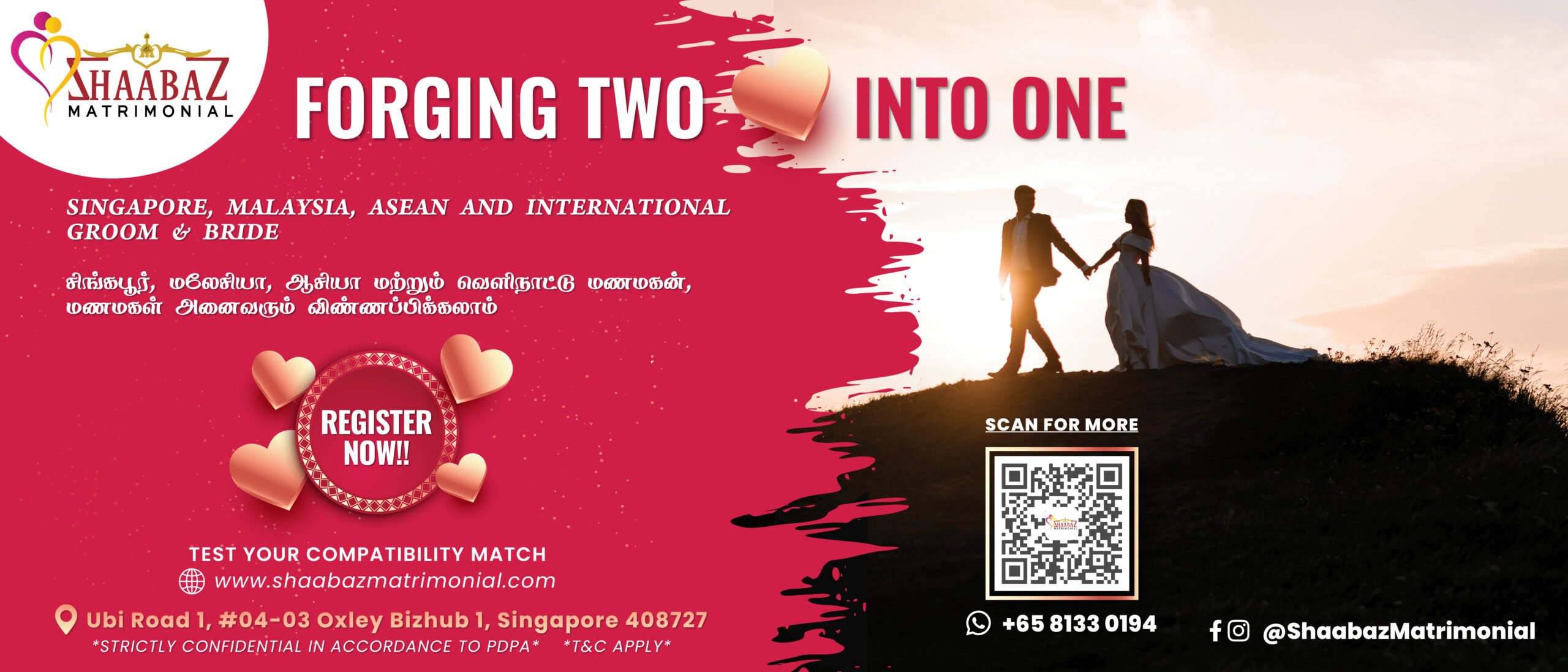Essential Guide to Indian Muslim Matrimony in Singapore
Discover everything about Indian Muslim matrimony in Singapore, from cultural traditions to legal requirements. Find your perfect match with trusted matrimonial services tailored for the Indian Muslim community.
Key Highlights
- Growing Community: Singapore’s thriving Indian Muslim community offers a rich pool of potential partners who share similar cultural and religious values.
- Diverse Backgrounds: From Sunni Hanafi to Sunni Shafii, Indian Muslims in Singapore come from varied backgrounds, providing diverse options for brides and grooms.
- Cultural Significance: Indian Muslim weddings in Singapore beautifully blend Indian traditions with Singaporean influences, creating unique and memorable ceremonies.
- Legal Framework: Singapore’s marriage laws, including requirements for Singapore citizens and Permanent Residents, play a crucial role in Muslim matrimony.
- Online Matrimony: Modern platforms with filters for “Singapore citizen” and “mother tongue” preferences make finding a compatible partner easier than ever.
- Trusted Services: Reputable Indian Muslim matrimonial platforms ensure a safe, efficient, and culturally sensitive matchmaking experience.
Introduction
Finding a life partner is a significant milestone, especially for the Indian Muslim community in Singapore. For Sunni Hanafi, Sunni Shafii, and other sects, the search for a suitable partner involves navigating cultural traditions, family expectations, and legal requirements. This guide provides a comprehensive overview of Indian Muslim matrimony in Singapore, offering valuable insights for citizens, Permanent Residents, and expats seeking their ideal match.
Key Aspects of Indian Muslim Matrimony in Singapore
Indian Muslim marriages in Singapore are a harmonious blend of tradition and modernity. Family plays a central role, with matchmaking often initiated through family networks or community groups. However, the rise of online matrimonial platforms has revolutionized the process, making it easier to connect with like-minded individuals.
Prospective brides and grooms often prioritize factors such as:
- Mother tongue (e.g., Tamil, Malayalam, Urdu, Hindi)
- Religious sect (e.g., Sunni Hanafi, Sunni Shafii)
- Educational and professional background
- Family values and cultural compatibility
These preferences highlight the importance of cultural fit in Indian Muslim matrimony.
Cultural Traditions and Practices
Indian Muslim weddings in Singapore are vibrant celebrations that reflect the community’s rich cultural heritage. While customs may vary based on sect and family background, certain traditions remain consistent:
- Mehndi Ceremony: Intricate henna designs adorn the bride’s hands, symbolizing love and prosperity.
- Sangeet: A lively pre-wedding event filled with music, dance, and joyous celebrations.
- Nikah: The Islamic marriage ceremony, often conducted in Urdu or Arabic, with the bride and groom signing the marriage contract.
- Walima: A grand reception hosted by the groom’s family to celebrate the union.
Language also plays a significant role, with weddings often incorporating Urdu, Hindi, Tamil, or Malayalam alongside English. These traditions create a beautiful fusion of Indian and Singaporean cultures, fostering strong family bonds and lasting memories.
Legal Requirements and Procedures
Singapore’s legal framework outlines specific requirements for Muslim marriages, ensuring they are legally recognized. Key considerations include:
| Requirement | Description |
| Minimum Age | 18 years and above |
| Residency Status | At least one party must be a Singapore Citizen or Permanent Resident |
| Religious Requirement | Both parties must be Muslim |
| Marriage Type | Only heterosexual marriages are recognized for Muslim couples |
Understanding these legal requirements is essential for a smooth and hassle-free marriage process.
Conclusion
Indian Muslim matrimony in Singapore is a beautiful blend of cultural traditions and modern practices. By understanding the unique customs, legal requirements, and available resources, you can navigate your matrimonial journey with confidence.
Whether you’re honoring cultural traditions or meeting legal obligations, this guide serves as a comprehensive resource for a seamless wedding experience.
For more insights or personalized assistance, explore our FAQ section or contact our experts for tailored advice.
Frequently Asked Questions (FAQs)
1. What are the unique cultural practices in Indian Muslim weddings in Singapore?
Indian Muslim weddings in Singapore often feature vibrant traditions such as the Mehndi ceremony, Sangeet, and Nikah. These events reflect a blend of Urdu, Hindi, and regional languages like Tamil and Malayalam, creating a unique cultural experience.
2. How does Singapore law affect Indian Muslim matrimonial practices?
Singapore law requires at least one party to be a Singapore Citizen or Permanent Resident for a marriage to be legally recognized. Additionally, both parties must be Muslim, and only heterosexual marriages are permitted.
3. How can I find a suitable match through online matrimonial platforms?
Reputable platforms offer advanced filters for preferences such as mother tongue, religious sect, and residency status, making it easier to find a compatible partner.



